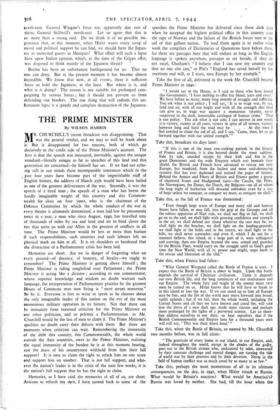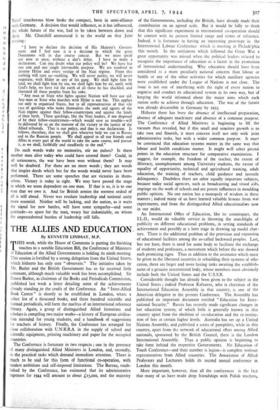THE PRIME MINISTER
By WILSON HARRIS
MR. CHURCHILL'S recent broadcast was disappointing. That was the general verdict, and we may as well be frank about it. But it disappointed for two reasons, both of which go decisively to the credit side of the Prime Minister's account. The first is that the speech was measured, inevitably, against the unique standard—literally unique as far as speeches of this land and this generation are concerned—he himself has set. If we had not echo- ing still in our minds those incomparable utterances which in the past four years have become part of the imperishable stuff of English history, the address of March 25th would have been hailed as one of the greatest deliverances of the war. Secondly, it was the speech of a tired man ; the speech of a man who has borne the hardly imaginable weight of this country and this Comrrion- wealth for close on four years, who is the chairman of the Defence Committee by which the whole conduct of the war in every theatre is ultimately determined, a man laid low by pneumonia twice in. a year, a man who since August, 1940, has travelled tens of thousands of miles by sea and land and air to bind closer the ties that unite us with our Allies in the greatest of conflicts in all time. The Prime Minister would be less or more than human if such responsibilities, such anxieties and such labours left no physical mark on him at all. It is on shoulders so burdened that the distraction of a Parliamentary crisis has been laid.
Memories are short. Are we in danger of forgetting what on every ground—of decency, of honesty, of loyalty—we ought to remember? The Prime Minister is getting above himself ; the Prime Minister is riding roughshod over Parliament ; the Prime Minister is acting like a dictator ; according to one commentator, whose superior knowledge and wisdom no doubt warrant such language, the interpretation of Parliamentary practice by the greatest House of Commons man now living is " most arrant nonsense." Ski be it. Everyone is free to write or speak as he chooses about the only imaginable leader of this nation on the eve of the most momentous military operation in its history. Not that there can be immunity from reasoned criticism for the Prime Minister or any other politician, and so polemic a Parliamentarian as Mr. Churchill would be the last of men to claim it. The Prime Minister's qualities no doubt carry their defects with them. But there are moments when criticism can wait. Remembering the immensity of the debt this country, this Commonwealth, the whole world outside the Axis countries, owes to the Prime Minister, realising the equal immensity of the burden he is at this moment bearing, can the mass of his countrymen withhold from him their full support? It is easy to claim the right to attack him on one score and. support him on another. That is not full support, and who- ever-the nation's leader is in the crisis of the next few weeks, it is the nation's full support that he has the right to claim.
Meniories, as I have said, the memories of all of us, are short. Anxious to refresh my own, I have turned back to some of the
speeches the Prime Minister has delivered since those dark days when he accepted the highest political office in this country after the rape of Norway and the failure of the British forces sent to the aid of that gallant nation. To read them again is to realise what work the compilers of Dictionaries of Quotations have before them. for there are passages /here that will endure as long as the English language is spoken anywhere, passages to set beside, if they do not excel, Chatham's " I believe that I can save my country and that no one else can," or Pitt's " England has saved herself by her exertions and will, as I trust, save Europe by her example."
Take the first of all, delivered in the week Mr. Churchill became Prime Minister in 1940:
" I would say to the House, as I said to those who have joined this Government, ' I have nothing to offer but blood, tears and sweat.' We have before us many, many long months of struggle and suffering. You ask what is our policy ; I will say; It is to wage war, by sea, land and air, with all our might and with all the strength that God can give us, to wage war against a monstrous tyranny, never surpassed in the dark, lamentable catalogue of human crime.' That is our policy. You ask what is our aim; I can answer in one word; it is victory, victory at all- costs, victory in spite of all terrors, victory, however long and hard the road may be. . . . At this time I feel entitled to claim the aid of all, and I say, ' Come, then, let us go forward together with our united strength.' " Take this, broadcast six days later : "If this is one of the most awe-striking periods in the ,history of France and Britain, it is also beyond doubt the most sublime. Side by side, unaided except by their kith and kin in the great Dominions and the wide Empires which rest beneath their shield, the British and French have advanced to rescue not only Europe, but mankind, from the foulest and most soul-destroying tyranny that has ever darkened and stained the pages of history. Behind the Armies and Fleets of Britain and France gather a grpup of shattered States and bludgeoned races—the Czechs, the Poles, the Norwegians, the Danes, the Dutch, the Belgians—on all of whom the long night of barbarism will descend unbroken even by a star of hope unless we conquer, as conquer we must, as conquer we shall."
Take this, as the fall of France was threatened:
" Even though large tracts of Europe and many old and famous States have fallen, or may fall, into the grip of the Gestapo and all the odious apparatus of Nazi rule, we shall not flag or fail, we shall go on to the end, we shall fight with growing confidence and strength in the air, we shall defend our island whatever the cost may be, we shall fight on the beaches, we- shall fight on the landing-grounds, we shall fight in the fields and in the streets, we shall fight in the hills, we shall never surrender; and even if, which I do not for a moment believe, this island, or a large part of it, were subjugated and starving, then our Empire beyond the seas, armed and guarded by the British Fleet, would carry on the struggle until in God's good time the New World, with all its power and might, steps forth to the rescue and liberation of the Old."
Take this, when France had fallen: " What General Weygand called the Battle of France is over. I expect that the. Battle of Britain is about to begin. Upon this battle depends the survival of Christian civilisation. Upon it depends our own British life, and the long continuity of our institutions and our Empire. -The whole fury and might of the enemy must very soon be turned on us. Hitler knows that he will have to break us in this island or lose the war. If we can stand up to him all Europe may be free, and the life of the world may move forward into broad, sunlit uplands ; but if we fail, then the whole' world, including the United States and all that we have known and cared for, will sink into the abyss of a new dark age, made more sinister and perhaps more prolonged by the lights of a perverted science. Let us there- fore address ourselves to our duty, so bear ourselves that if the British Commonwealth and Empire lasts for a thousand years men will still say, This was their forest hour.' "
Take this, when the Battle of Britain, so named by Mr. Ghurchill two months before, was in full crisis:
"The gratitude of every home in our island, in our Empire, and, indeed throughout the world, except in the abodes of the guirty, goes out to the British airmen who, undaunted by odds, unwearied by their constant challenge and mortal danger, are turning the tide of world war. by their prowess and by .their devotion. Never in the field of human conflict was so much owed by so many to so few."
Take 'this, perhaps the most momentous of all in ..its ultimate consequences, on the day, in 1941, when Hitler struck at Russia. What would be Britain's reaction? What would be America's? Russia was loved by neither. -She had; till the hour when the Nazis' treacherous blow broke the compact, been in semi-alliance with Germany. A decision that would influence, as it has influenced, the whole future of the war, had to be taken between dawn and dusk. Mr. Churchill announced it to the world on that June
evening: "I have to declare the decision of His Maiesty's Govern- ment and I feel sure it is a decision in which the great Dominions will in due course concur. But we must speak out now at once, without a day's delay. I have to make a declaration. Can you doubt what our policy will be? We have but one aim and one single irrevocable purpose. We are resolved to destroy Hitler and every vestige of the Nazi regime. From this nothing will turn us—nothing. We will never parley, we will never negotiate, with Hitler or any of his gang. We shall fight him by land, we shall fight him by sea, we shall fight him by air, until, with God's help, we have rid the earth of all those he has shackled, and liberated all those peoples from his yoke.
"Any man or State who fights against Nazism will have our aid. Any man or State who marches with Hitler is our foe. This applies not only to organised States, but to all representatives of that vile race of quislings who make themselves the tools and agents of the Nazi regime against their fellow-countrymen and against the lands of their birth. These quislings, like the Nazi leaders, if not disposed of by their fellow-countrymen—which would save us trouble—will be delivered by us on the morrow of the victory to the justice of the Allied tribunals. That is our policy, and that is our declaration. It follows, therefore, that we shall give whatever help we can to Russia and to the Russian people. We shall appeal to all our friends and Allies in every part of the world to take the same course, and pursue it, as we shall, faithfully and steadfastly to the end."
Do such words wake no memories, stir no pulses? Is there another man alive today who could have uttered them? Could, in all seriousness, the war have been won without them? It may well be doubted. For these are no mere words ; they are words that inspire deeds which but for the words would never have been performed. There are some speeches that are victories in them- selves. Victory is today in sight. We may have passed the stage in which we seem dependent on one man. If that is so, it is to one man that we owe it. And for British armies the sternest ordeal of all is still ahead. Never was resolute leadership and national unity more essential. Neither will be lacking, and the nation, as it waits the signal for new battles, will have some sympathy—and some gratitude—to spare for the man, weary but indomitable, on Whom the unprecedented burden of leadership still falls.



























 Previous page
Previous page